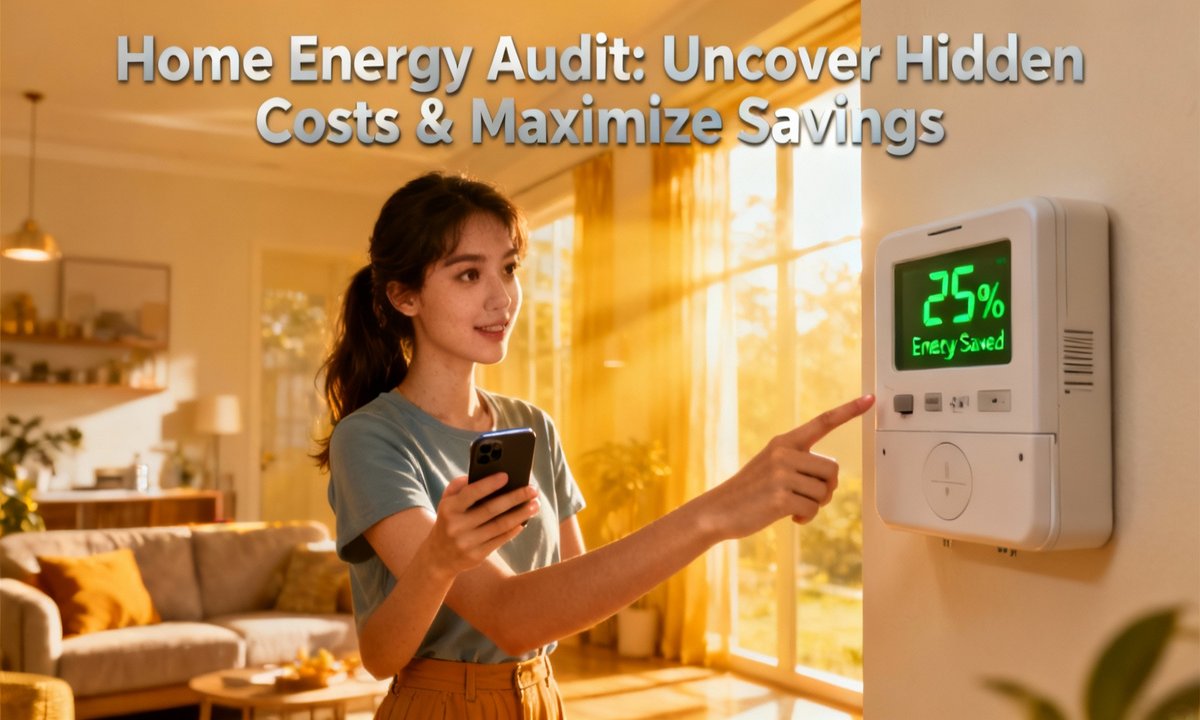A home energy audit can be a powerful tool for discovering hidden energy drains, leading to significant savings on utility bills and enhanced home comfort. It’s about transforming uncertainty into clear, actionable steps that benefit both your budget and the environment. This crucial process helps identify and address inefficiencies, turning potential losses into real financial gains.
What is a Home Energy Audit?
A home energy audit, also known as a residential energy audit or energy efficiency audit, thoroughly examines how your home consumes and loses energy. The primary objective is to pinpoint inefficiencies such as air leaks, inadequate insulation, and older appliances. This review then suggests practical solutions, often leading to 5–30% savings on your energy expenses. Experts frequently use advanced tools like thermal imaging inspection, though even a simple DIY checklist can uncover many opportunities to maximize energy savings.
Why Energy Audits are Crucial: Uncovering Hidden Costs
Many energy losses don’t present obvious signs. Often, invisible culprits like subtle drafts from doors, tiny wall cracks, or an inefficient HVAC system are quietly driving up your utility bills. An energy savings audit is designed to reveal these unseen inefficiencies, giving you the information needed to implement effective solutions. You can learn more about common findings that could be impacting your home.
Wondering about the potential for savings? Combining a comprehensive home energy audit with strategic upgrades can dramatically reduce your expenses. For practical ideas on how to achieve this, explore article on Slash Your Electric Bill: Top 7 Smart Home Upgrades for Energy Savings.
The Professional Energy Audit Process
Professional energy audit services offer a systematic approach to enhancing your home’s energy efficiency. This detailed examination removes any guesswork, providing clear insights into your home’s performance. The process typically involves several key stages to ensure a thorough assessment.
Step-by-Step Guide
During the initial consultation, you’ll discuss past utility bills and any specific comfort issues, like drafty areas or unusually warm rooms. An exterior inspection then identifies visible cracks, potential leaks, or signs of insulation problems on the outside of your home. Following this, an interior review meticulously examines areas such as walls, attics, basements, appliances, and mechanical systems.
Critical diagnostic tests are performed next, often including a blower door test to pinpoint air leaks and thermal imaging inspection to reveal hidden insulation gaps. Finally, you receive a detailed report. This report prioritizes recommended improvements, clearly indicating which investments will yield the greatest returns and help you reduce utility bills and uncover hidden energy costs.
DIY vs. Professional Energy Audits
Undertaking a home energy audit yourself is certainly possible, providing a cost-effective way to start identifying inefficiencies. While a DIY approach may not offer the precision of professional equipment, it can still reveal significant opportunities for improvement. Here’s a brief checklist to guide your personal energy efficiency testing efforts.
Your DIY Checklist for Energy Efficiency
Focus on checking insulation quality in attics, walls, and floors, and inspect for window and door leaks, considering weatherstripping as a solution. Look for outdated lighting and swap to LEDs, and examine appliances for ENERGY STAR labels. Don’t forget HVAC tune-ups, including filter replacements and duct insulation, along with adjusting hot water heater settings and insulating pipes.
When to Call a Pro
While DIY audits are valuable for initial insights, they typically lack the advanced diagnostic capabilities of professional tools, such as blower door tests or thermal imaging. For more intricate issues, significant investments, or when aiming to qualify for financial incentives, engaging a certified professional is often the best choice. To further enhance your efforts, consider exploring advanced strategies to energy-proof your home for winter or delve into the world of advanced smart home energy efficiency for cutting-edge solutions.
Top Energy-Saving Upgrades Post-Audit
Once you have the detailed report from your home energy audit, prioritizing improvements is key to maximizing your return on investment. The most impactful projects often involve addressing fundamental inefficiencies within your home’s structure and systems. These targeted upgrades can significantly reduce your ongoing energy expenses.
High-Impact Improvements for Energy Efficiency
Among the top recommendations are sealing air leaks in critical areas like attics, floors, windows, and doors, which can prevent substantial energy loss. Upgrading outdated insulation is another high-value project, as is installing a programmable thermostat or advanced smart home controls for better energy management. Replacing older HVAC systems or inefficient appliances also consistently delivers excellent payback.
To ensure your heating and cooling systems are performing optimally year-round, exploring our article on Maximize Summer Savings: 5 HVAC Maintenance Tips to Cut AC Costs can provide valuable insights. Additionally, understanding water consumption can reveal another source of hidden energy drain. For more interconnected savings ideas, consider reading Water Wise Home: Top Strategies to Conserve & Cut Utility Bills.
Costs, ROI, and Financial Incentives
Understanding the financial aspects of a home energy audit is crucial for planning your investment. While there’s an upfront cost, the potential for long-term savings and available incentives can make it a highly worthwhile endeavor. It’s important to factor in both the audit cost and the benefits of subsequent upgrades.
Understanding the Costs of a Professional Audit
Professional energy audits generally range from $100 to $500, with variations based on your location and the thoroughness required. A significant benefit for U.S. homeowners is the availability of a federal tax credit. You could claim 30% of the audit cost, up to $150, through the Energy Efficient Home Improvement Credit.
Federal Tax Credits and Local Programs
Beyond the audit itself, you may also qualify for 30% (up to $500) in tax credits for follow-up energy-saving improvements. Further details can be found in the ENERGY STAR guide. Additionally, many regions offer state and local rebates, utility incentives, or accessible low-interest loans. These programs vary frequently, so checking your local utility’s website or Department of Energy resources is advisable to discover perks that can significantly reduce initial costs and enhance your return on investment.
Preparing for Your Home Energy Audit
To ensure you gain the maximum benefit from your home energy audit, a little preparation goes a long way. Being ready can help the auditor conduct a more comprehensive and accurate assessment, leading to more precise recommendations for energy savings. Thoughtful preparation ensures no critical details are overlooked.
Start by gathering 12 months of utility bills to provide historical data on your energy consumption. Make notes of any specific areas of concern, such as drafts, persistent cold spots, or unusually high bills. It’s also helpful to clear access to key areas like the attic, basement, crawl space, and mechanical rooms.
Finally, compile a list of any recent home improvements, including insulation, window replacements, or new thermostats. This information helps the auditor understand your home’s energy history and current state, allowing them to provide the clearest picture of potential hidden energy costs and optimal solutions.
Benefits of a Home Energy Audit
Considering a home energy audit offers a multitude of advantages that extend beyond just reducing utility bills. This strategic assessment can significantly improve your living environment and contribute to a more sustainable lifestyle. It’s an investment that pays off in various tangible and intangible ways.
The primary benefits include consistently smaller utility bills and a noticeably more comfortable living space throughout the year. Beyond immediate savings, an energy-efficient home often translates to a higher property value, making it a wise long-term investment. You’ll also achieve a smaller environmental footprint by reducing your energy consumption.
Furthermore, undertaking an audit can unlock access to valuable financial incentives, including rebates and tax credits, further boosting your return on investment. For those dedicated to environmental responsibility, exploring Sustainable Home: Eco-Friendly Products for a Greener Living Space could provide further inspiration for your next upgrades.
Common Findings Revealed by Audits
A significant advantage of a professional home energy audit is its ability to uncover hidden issues that might be silently increasing your energy consumption and costs. These are often problems that aren’t visible or immediately noticeable but can have a substantial impact on your utility bills. Understanding these common findings helps you anticipate potential areas of concern.
Audits frequently reveal instances of poor insulation in critical areas like the attic, walls, or crawl spaces, leading to considerable heat loss or gain. Another common discovery is air leaks around windows, doors, electrical outlets, and even chimneys. Inefficient heating or cooling systems and older, less efficient appliances are also frequent culprits.
Other typical findings include uninsulated hot water pipes, which lose heat unnecessarily, and outdated lighting, such as incandescent and CFL bulbs, which consume more power. While every home has its unique characteristics, addressing these widespread problems is crucial for maximizing energy savings and reducing hidden costs.
Expert Advice for a Successful Home Energy Audit
To truly maximize the benefits of a home energy audit, whether professional or DIY, it’s wise to follow some expert recommendations. These tips ensure accuracy, efficiency, and the greatest potential for long-term savings and comfort in your home. Strategic planning can turn an audit into a powerful tool for energy management.
Consider scheduling a professional audit every 5–10 years, especially after major upgrades or renovations, to reassess your home’s energy performance. Always check credentials to ensure your auditor is certified by recognized organizations like the Department of Energy. For interim assessments, DIY smartly by using reputable guides and energy audit kits.
When it comes to implementing changes, prioritize upgrades that offer the highest projected savings and quickest payback period. Finally, to achieve the most significant financial advantages, remember to stack incentives by combining federal tax credits with state programs and local utility rebates.
Beyond the Basics: Advanced Energy Upgrades
After addressing the foundational issues identified in your home energy audit, such as insulation leaks and HVAC system improvements, you might be ready for more advanced energy-saving strategies. These next-level upgrades can push your home’s efficiency even further, leading to greater long-term savings and environmental benefits.
Consider investing in sophisticated technologies like smart thermostats that learn your habits, advanced HVAC controls, or high-tech insulation materials. If you are contemplating significant shifts in your energy source, delving into Harnessing Home Power: Beginner’s Guide to Residential Renewable Energy can offer guidance on options such as solar panels or geothermal systems.
Remember, before diving into complex installations, it’s always beneficial to explore basic efficiency tips. Often, smaller, incremental changes can yield surprisingly substantial savings, building a strong foundation for any future advanced upgrades.
Frequently Asked Questions
How much can I save with a home energy audit?
The potential for savings from a home energy audit is significant, typically ranging from 5% to 30% of your household energy bill. This percentage depends largely on factors such as your home’s age, its current state of efficiency, and the specific improvements you choose to implement after the audit, as highlighted by various studies.
How do I find a home energy audit near me?
To locate a reliable home energy audit service in your vicinity, begin by searching online for “home energy audit near me.” Prioritize certified professionals who are recognized by the Department of Energy or local utility companies. Recommendations from neighbors or local sustainability groups can also be an excellent starting point for your search.
Are there special incentives for energy audit services in my area?
Indeed, most states and many local jurisdictions offer various rebates or incentives designed to encourage energy efficiency. It’s highly recommended to contact your local utility provider directly or consult the DOE rebate finder to discover what specific programs might be available in your area.
Can I really do a home energy audit myself?
Performing a DIY home energy audit is certainly feasible using credible online guides and checklists, offering a good initial assessment. However, for the most accurate and comprehensive evaluation of your home’s energy performance, and especially to qualify for many financial incentives, a professional residential energy audit is generally recommended.
What’s included in an energy efficiency audit?
A thorough energy efficiency audit comprehensively examines various aspects of your home, including insulation quality, the integrity of doors and windows, the efficiency of your HVAC system, water heater performance, and appliance efficiency. It often involves advanced diagnostic tools such as thermal imaging inspection and blower door testing to pinpoint hidden issues.
Take Action: Start Your Savings Journey Today
Empowering yourself with knowledge is the first step toward optimizing your home’s value and efficiency. A home energy audit, whether conducted by you or a professional, serves as a crucial roadmap, pinpointing exactly where energy is being lost and how to reclaim those costs. It’s an opportunity to take decisive control over your energy future.
Are you ready to significantly reduce utility bills, enjoy a more comfortable living environment, and proactively manage your energy consumption? Consider these actionable steps to begin your journey toward a more efficient home. Each choice brings you closer to realizing substantial long-term benefits and fostering a greener lifestyle.
You can book a professional audit for expert, tailored advice or start a DIY checklist using readily available, reputable online guides. Remember to actively explore incentives and credits, ensuring you take advantage of all available financial support. For further inspiration on transformative upgrades, be sure to review our article on Advanced Smart Home Energy Efficiency.
Ready to uncover hidden costs and maximize energy savings? Explore your options, and start your path to a more efficient home today.
For more smart tips on energy savings, household upgrades, and practical living, keep exploring our home resource articles.




